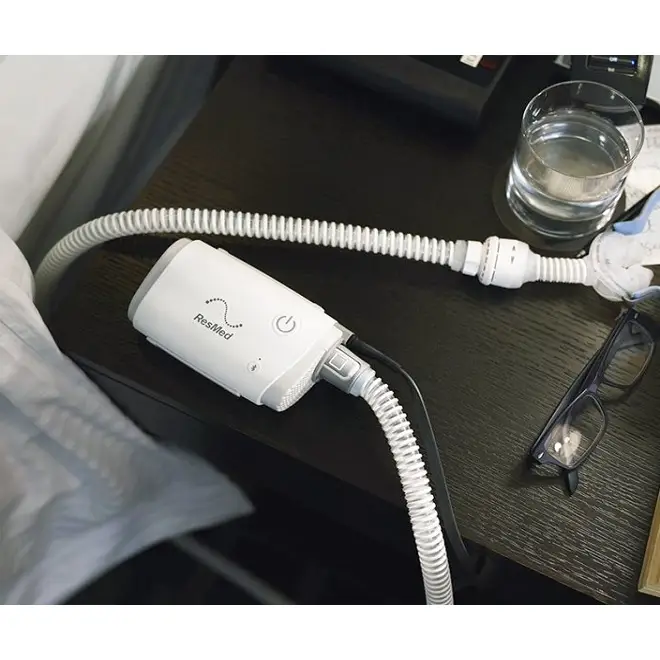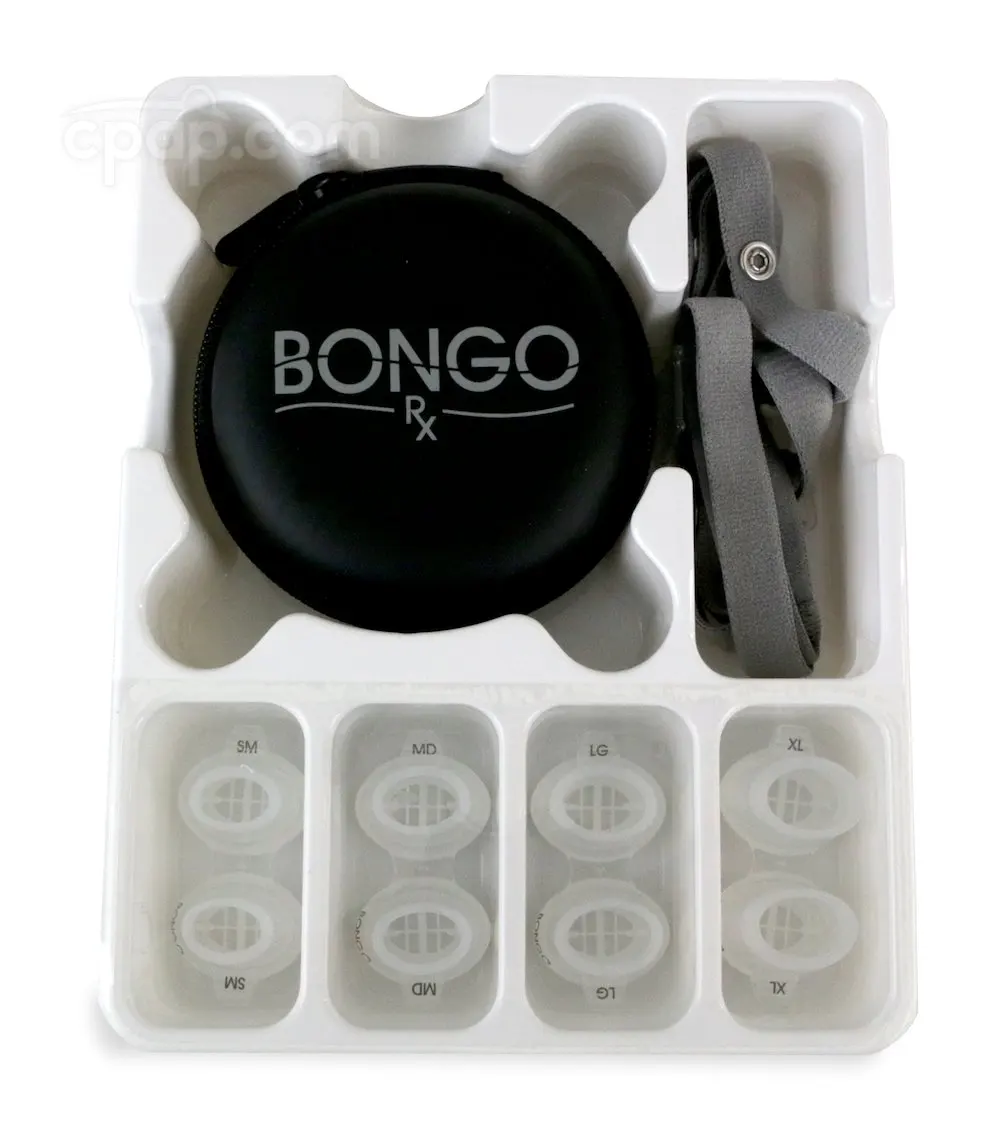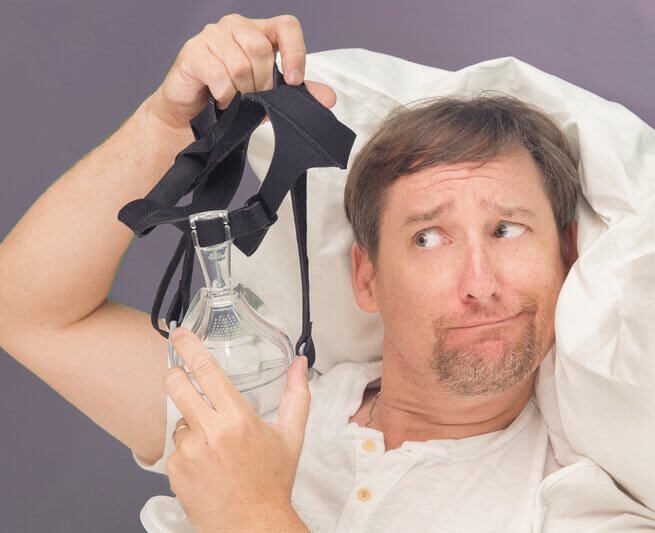The AirMini is a great option for people who travel frequently or who want a CPAP machine that is easy to take with them on the go. It is also a good option for people who find traditional CPAP machines to be too bulky or noisy.
The AirMini has a number of features that make it a good choice for people with sleep apnea. These features include:
- Quiet operation: The AirMini is one of the quietest CPAP machines on the market, with a sound level of only 29 decibels.
- Waterless humidification: The AirMini uses a waterless humidification system that is designed to make it more convenient to use on the go.
- AutoSet technology: The AirMini AutoSet model automatically adjusts the pressure of the air that is delivered to the user based on their needs.
- Bluetooth connectivity: The AirMini can be connected to a smartphone app that allows users to track their sleep therapy data and make adjustments to their settings.
The AirMini is a great option for people with sleep apnea who are looking for a portable and convenient CPAP machine. It is also a good option for people who find traditional CPAP machines to be too bulky or noisy.
Resmed Mini Vs. A Regular Sized CPAP
The ResMed AirMini and a regular-sized CPAP machine both treat sleep apnea by delivering continuous positive airway pressure (CPAP) to keep your airway open during sleep. However, they differ in several key ways:
Size and Portability:
- AirMini: This is the world’s smallest CPAP machine, weighing only 10.6 ounces and about the size of a smartphone. It’s perfect for travel or for those who find traditional machines bulky.
- Regular-sized CPAP: These machines are typically much larger and heavier, weighing around 2-5 pounds. They are not as portable and can be inconvenient to travel with.
Noise:
- AirMini: One of the quietest CPAP machines on the market, with a sound level of only 29 decibels, similar to a quiet whisper.
- Regular-sized CPAP: Can be louder, ranging from 30-45 decibels, comparable to a normal conversation.
Humidification:
- AirMini: Uses a waterless humidification system called HumidX, which is convenient and eliminates the need for distilled water.
- Regular-sized CPAP: Most models have built-in humidifiers that require distilled water to be added regularly.
Features:
- AirMini: Offers features like AutoSet technology that automatically adjusts pressure, Bluetooth connectivity for tracking sleep data via a smartphone app, and optional heated tubing for added comfort.
- Regular-sized CPAP: May have similar features like AutoSet and heated tubing, but some models lack Bluetooth connectivity or have more basic options.
Price:
- AirMini: Generally more expensive than regular-sized CPAP machines due to its compact size and advanced features.
- Regular-sized CPAP: Wider range of prices depending on features and brand.
Suitability:
- AirMini: Ideal for travelers, those with limited space, or people who find traditional machines bulky or noisy.
- Regular-sized CPAP: Suitable for most people with sleep apnea, especially those who require high pressure settings or prefer a more traditional setup.
Advantages of a Mini CPAP
There are several advantages to using a mini CPAP machine like the ResMed AirMini compared to a regular-sized CPAP:
Portability and Travel:
- Size and weight: Mini CPAPs are significantly smaller and lighter, making them perfect for travel or overnight trips. The AirMini, for example, weighs only 10.6 ounces and fits in the palm of your hand.
- Convenience: They easily fit in suitcases or backpacks, eliminating the need for bulky travel CPAP cases.
- Discreetness: Their compact size makes them more discreet and less noticeable during use, especially helpful for public spaces or shared accommodations.
Noise Level:
- Quieter operation: Mini CPAPs tend to be quieter than their larger counterparts, often with sound levels below 30 decibels, comparable to a whisper. This can significantly improve sleep quality for both the user and their partner.
Humidification:
- Waterless options: Some mini CPAPs, like the AirMini, offer waterless humidification systems like HumidX. This eliminates the need for distilled water and its associated refills, maintenance, and potential leakage.
Ease of Use:
- Simplified design: Mini CPAPs often have fewer buttons and a more intuitive interface, making them easier to use and adjust settings.
- Smartphone connectivity: Some models offer Bluetooth connectivity and companion apps for data tracking, adjustments, and remote monitoring.
Other Advantages:
- Increased compliance: The portability and convenience of mini CPAPs can encourage better adherence to sleep therapy, leading to improved health outcomes.
- Discrete storage: Their small size allows for easier storage at home or on the go, reducing clutter and freeing up space.
- Environmental benefits: Waterless humidification systems can lessen the environmental impact of CPAP therapy by reducing water usage.
However, it’s important to consider that mini CPAPs may not be for everyone. They may not be suitable for:
- Individuals requiring high pressure settings: Some mini CPAPs have lower pressure limits than regular-sized machines.
- People with complex sleep apnea: They may need features not available on all mini CPAPs.
- Those who prefer mask options not offered by mini CPAPs: Mini CPAPs may have compatible masks suitable for most users, but options can be limited compared to standard machines.
Reasons To Go With Resmed
- Industry leader: ResMed has been a leading manufacturer of CPAP machines and sleep apnea equipment for over 30 years. They have a strong track record of innovation and product development.
- High-quality products: Their CPAP machines are known for their durability, reliability, and effectiveness in treating sleep apnea. They offer a wide range of models to suit different needs and budgets.
- Positive customer reviews: ResMed generally receives positive reviews from customers who praise their products’ ease of use, comfort, and effectiveness. They have a 4.4 out of 5 star rating on Trustpilot based on over 700 reviews.
- Doctor and industry recommendations: ResMed is a popular choice among doctors and sleep specialists. They are often recommended to patients with sleep apnea.
- Awards and recognition: ResMed has received numerous awards and accolades for their products and commitment to sleep health.
However, it’s important to remember that no company is perfect. Here are some potential drawbacks to consider:
- Cost: ResMed’s CPAP machines can be more expensive than some other brands.
- Customer service complaints: While generally positive, some customers have reported issues with ResMed’s customer service.
- Limited mask options: While they offer several mask options, they may not have as many as some other brands.

CPAP Machines Similar to the Resmed Airmini
The ResMed AirMini is a popular choice for portable CPAP machines, but there are certainly other options out there depending on your specific needs and priorities. Here are a few CPAPs similar to the AirMini:
CPAPs with similar portability and size:
- Philips DreamStation Go: Similar in size and weight to the AirMini, with additional features like an integrated battery and heated tubing. However, it lacks waterless humidification and is slightly louder.
- BMC Resound: Another ultra-portable option, even smaller and lighter than the AirMini. However, it has limited pressure settings and fewer features.
- Fisher & Paykel F&P SleepStyle Go: Compact and lightweight with built-in battery and optional heated tubing. However, it is not waterless and slightly larger than the AirMini.
CPAPs with similar features:
- ResMed AirSense 11 AutoSet for Her: Offers advanced features like automatic pressure adjustments, integrated humidifier, and smartphone connectivity. It’s not portable like the AirMini but provides more detailed data and comfort options.
- Philips DreamStation BiPAP Auto SV: A BiPAP machine for those with complex sleep apnea, offering both inspiratory and expiratory pressure support. It has similar features to the AirSense 11 but is not portable.
- Löwenstein Prisma SMART: A quiet and compact device with built-in humidifier and integrated battery. However, it is not as small as the AirMini and lacks some advanced features.
Alternative considerations:
- Mask compatibility: Make sure the chosen CPAP is compatible with your preferred mask type. While most offer standard mask connections, some have specific compatibility requirements.
- Humidification needs: Consider if you require a humidifier and whether a waterless option like the AirMini’s HumidX would be beneficial.
- Price: Prices can vary significantly, so compare options within your budget.
Mini CPAP Comparison Chart
| Brand | Model | Price Range (USD) | Key Features | Image |
|---|---|---|---|---|
| ResMed | AirMini | $500-$700 | World’s smallest CPAP, waterless humidification, AutoSet technology, Bluetooth connectivity | |
| Philips | DreamStation Go | $400-$600 | Integrated battery, heated tubing, quiet operation | |
| BMC | Resound | $300-$400 | Ultra-portable and lightweight, simple controls | |
| Fisher & Paykel | F&P SleepStyle Go | $400-$500 | Built-in battery, optional heated tubing, quiet operation | |
| Löwenstein | Prisma SMART | $400-$500 | Quiet and compact, integrated battery, built-in humidifier |
Additional factors to consider:
- Mask compatibility: Make sure the chosen CPAP is compatible with your preferred mask type.
- Humidification needs: Consider if you require a humidifier and whether a waterless option would be beneficial.
- Pressure settings: Some mini CPAPs have lower pressure limits than regular-sized machines.
- Advanced features: Some models offer additional features like data tracking, remote monitoring, and smartphone connectivity.








